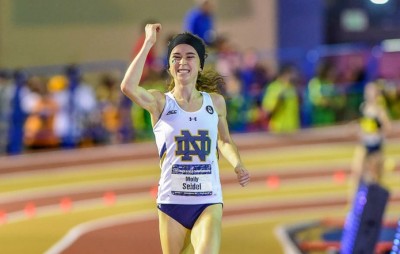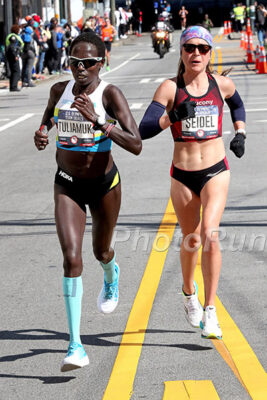Recovering from the Trials, Returning to the Track, & Time-Trialing a Marathon? LRC Catches Up with Molly Seidel
By Jonathan Gault
July 14, 2020
Race-week routines for professional runners are a little different in the summer of 2020. Molly Seidel is planning on competing on Saturday, her first race since her surprising second-place finish at the US Olympic Marathon Trials back in February. But in order to be cleared for competition, Seidel must produce two negative COVID-19 tests this week. And her first attempt at test #1, at Tufts Medical Center in Boston, where Seidel is based, was unsuccessful — when she showed up on Monday, she was told it would take two hours or more for her to get tested.
Seidel opted not to wait, and by the time I connected with her by phone Monday afternoon, she had made alternate plans.
“Dana Giordano, who’s doing the 1500, I’m going to be driving with her up to Chelsea, which is about a half-hour north of the city later this afternoon hoping that it will be a little bit shorter of a wait,” Seidel says. “It’s pretty difficult finding spots, and I think that’s been the biggest for most people competing [this weekend].”
Turns out, Seidel couldn’t get tested in Chelsea, either, and had to try again in Boston on Tuesday.
The requirement of two negative tests (which must be separated by at least 24 hours) is one of the “preferred criteria” listed by USATF in its guidance to meet directors hoping to stage competitions in the age of COVID-19, and it’s one Seidel’s coach Jon Green — meet director of this weekend’s MVMNT Race Series, the event in which Seidel will make her return — has chosen to implement. So add COVID tests (at least temporarily) to strides, shake-outs, and pasta dinners on the list of pre-race athlete traditions.
***
Seidel’s world had already changed plenty before the United States became familiar with concepts like self-quarantining and Dr. Anthony Fauci. As recently as December, Seidel, now 26, hadn’t even planned on running the Olympic Trials Marathon; she was supposed to race Houston in January instead. But once she hit the qualifying standard with her 70:27 at the Rock ‘n’ Roll San Antonio Half Marathon on December 8, Seidel decided she might as well give the Trials a go. To the shock of almost everyone, she made the Olympic team by finishing second in Atlanta. And to the shock of Seidel, she became an overnight media sensation.
The fact that Seidel made the team in her marathon debut led to a feature in the New York Times and an appearance on NBC Nightly News. But the headlines also created confusion.
“A lot of people kind of misconstrued that as, Oh, she literally hasn’t run before, this is so crazy,” Seidel says.
On her flight out of Atlanta, the flight attendants recognized Seidel. They asked if she had trained for the race.
“I was like, yes, I’m a professional runner,” Seidel says. “This is how I make my living.”
On the women’s side, Seidel was the story of the Trials, and her incredible debut resulted in far more coverage than what was afforded to race winner Aliphine Tuliamuk or third-placer Sally Kipyego — both Kenyan-American immigrants. Several observers noted the disparity, which put Seidel, who had no control over any of it, in an awkward position. Tuliamuk was actually brought to tears when she sat down to watch the race two days later.
“I don’t think NBC did a great job covering the Trials,” Seidel says. “There was a reason they didn’t talk about me in the broadcast. I was a nobody coming in. But Sally and Aliphine were really big names coming into that race. They should have been talked about, and I think because they aren’t seen as ‘American-born,’ people keep saying, ‘Oh, they’re Kenyan-born.’ No, they’re Americans. They deserve to be talked about, they deserve to have their accomplishments put there on the broadcast.”
Less than two weeks after the Trials, the US began shutting down due to the coronavirus, which has necessitated certain changes in Seidel’s training routine. Back on May 6, Massachusetts governor Charlie Baker mandated anyone in a public place who cannot maintain a six-foot social distance must wear a mask or face covering, a restriction that remains in place. Seidel says she’s done her best to follow the regulations — “the rule of thumb I think that most pro runners in town have is that you wear a mask or a bandana pretty much on every single run and then you can take it down if you’re in an area where there’s not a lot of people around” — but says she’s still had people yell at her on runs.
“That’s kind of an every-run thing,” Seidel says. “Everybody’s got a different opinion. If you’re not wearing it fully over your nose, you’ll get yelled at. If you’re talking while you pass people — even if you’re wearing a mask — sometimes they’ll yell at you. It can be a little bit frustrating sometimes, but I feel like everybody out here is just trying to do their best.”
Note: Our talk with Seidel is out and on this week’s LetsRun.com Track Talk Podcast. Listen in the player below. Seidel starts at the [spp-timestamp time=”59:09″] mark
[spp-player track_player url=”https://pinecast.com/listen/6e66bf28-f748-4e61-9c5d-136bd7fb9d60.mp3″ title=”Molly Seidel podcast”]
Even after making the Olympics in the marathon, Seidel’s pre-pandemic plans included a track season: she wanted to race the 10,000 at Payton Jordan and the Olympic Trials, a meet she missed in 2016 due to injury. And with USATF declaring that marks achieved this summer can be used to qualify for the Trials, Green decided to stage his own meet for Seidel (and others) to chase that time.
The MVMNT Race Series — which will be held on Saturday at an undisclosed location in Massachusetts to prevent spectators but will be streamed live on Instagram by Citius Mag — features a women’s 1500 and men’s 10,000, but the women’s 10,000 is the marquee event, highlighted by Seidel, 2016 Olympian Abbey Cooper, 2012 Trials runner-up Natosha Rogers, and the resurgent Keira D’Amato, who ran 15:04 for 5,000 last month. The goal is to get as many women under the Trials standard of 32:25 as possible, but Seidel (whose 32:24 pb dates to the 2018 USA final, her most recent track race) and the top women could end up running faster: pacer Aisling Cuffe has been tasked with taking them through 5k in 16:00.
The event will also raise money for Good Sports, a non-profit that aims to get children in low-income communities involved in sports. Though there’s no prize money for the event, several athletes have pledged a portion of any time-related contract bonus they hit in the meet toward the charity, and there is a GoFundMe page for fans to donate.
 Seidel winning her 4th and final NCAA title at Notre Dame. *2016 NCAA Indoors photo gallery
Seidel winning her 4th and final NCAA title at Notre Dame. *2016 NCAA Indoors photo gallery
“I think a lot of what’s going on right now with Black Lives Matter and more awareness of racial justice is realizing how unequal the playing field is for a lot of kids trying to get into sports,” Seidel says. “Running is, straight-up, a super-white sport. I grew up in an area where pretty much everybody I saw running cross country was white. And I think being able to increase access to sports, whether it’s running, whether it’s football, soccer, lacrosse — being able to make sure that kids who don’t necessarily have the financial resources to play a lot of different sports, being able to give them access to that is super important…A pair of spikes for a kid who’s just starting out, that’s the kind of stuff that could really change someone, [and determine] whether they stay in the sport or not.”
Beyond this weekend’s race, Seidel’s biggest goal for the upcoming year is to become a better marathoner before hitting the Olympic stage in Sapporo. Which is difficult when there might not be any major marathons this fall — yesterday, Chicago and Toronto added their names to the list of cancelled 2020 marathons.
Green and Seidel, however, are adamant that Seidel needs to gain more experience over 26.2 miles — a distance Seidel has only ever covered once in her life. And with the the spring marathon season looking far from certain, Green’s plan is for Seidel to race a hard effort — perhaps 30k, perhaps even a full marathon — by any means necessary this fall.
“In the worst-case scenario, we time-trial, ” Green says. “That’s the worst-case scenario, we’ll try to do a marathon build and if that means we time-trial somewhere in December, we time-trial somewhere in December.”
For most runners, time-trialing a marathon ranks somewhere between pulling teeth and passing a kidney stone. But if it’s what Seidel has to do, she’ll find a way to make it happen.
“Nobody dreams of having to go time-trial a marathon,” Seidel says. “But nobody ever dreamed that the world would be in the kind of situation that we are right now. If I can get through a marathon buildup healthy, and we get to the point where maybe there isn’t a race that I can do but I’m in a situation where I have people who are willing to help me run a marathon — hell, Jon and I have been able to put on this track meet, maybe we could put on a low-key marathon as well. We’re making do with the situation that we have. So many things about what’s going on right now suck, but it’s just the world we live in and there’s no use whining about it.”



